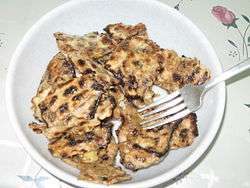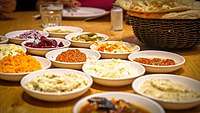Matzah brei
Matzah brei (Yiddish: מצה ברײַ; Hebrew: מצה בריי, matzah brei, or מצה מטוגנת, matzah metugenet, literally, "fried matzah"), sometimes spelled matzah brie or matzo brei, is a dish of Ashkenazi Jewish origin made from matzah fried with eggs. It is commonly eaten as a breakfast food during the Jewish holiday of Passover.

Etymology
The German word brei refers to a "porridge-like mush".[1] In modern Yiddish, brei means "fry".[2]
History
Gil Marks in his Encyclopedia of Jewish Food asserts that matzah brei as a fried matzah-and-egg dish originated in North America. He notes the publication of a recipe for "Fried Matzos", consisting of soaked whole matzah fried in butter or schmaltz, in The Jewish Manual (London, 1846).[3] However, egg-based recipes began to be published in early Jewish-American cookbooks, including Aunt Babette's (1889 edition) and The Settlement Cook Book (1901).[3] These early recipes called for whole matzahs or large, broken pieces of matzah to be dipped in beaten egg and then fried. Marks credits the development of matzah brei – in which crumbled pieces of matzah and beaten egg are combined before frying – to the influence of Eastern European Jewish immigrants to the United States.[3] Marks adds that the introduction of machine-made matzah produced "a slightly thicker and flakier matzah than that made by hand", and is the ideal type of matzah to use for this dish.[3]
Preparation
There are numerous ways to prepare the dish, as well as flexibility in ingredients.[2][4] The basic ingredients are matzah, eggs, and a "softening" liquid for the matzah, such as hot water or milk.[2] Typically the dry matzah is broken into pieces, briefly softened in water or milk, mixed with beaten eggs, and fried in a skillet. The frying is done with oil or butter.[5] Alternately, the matzah is crumbled and then combined with beaten egg. The matzah and egg mixture may be scrambled, set to cook like a pancake, or fried like a tortilla.[2][3]
Matzah brei can be made savory or sweet. Savory recipes add salt, pepper, onions, or sauerkraut to the matzah and egg, and the mixture may be fried in schmaltz.[2][6] Sweet recipes add honey, cinnamon, cheese, or fruit to the matzah and egg.[2][3] The cooked dish is often topped with any of the following: jam, honey, cinnamon and sugar, syrup, applesauce, sour cream, yogurt, salt and pepper, or garlic powder.[3][6][7]
Matzah brei is commonly eaten as a breakfast food during Passover by Ashkenazi Jews.[3][8] However, Hasidic Jews do not eat matzah brei or other cooked matzah dishes (such as matzah balls) during Passover due to the stringency against eating gebrochts, matzah that has come into contact with water.[9] Those who avoid eating gebrochts will eat matzah brei and other cooked matzah dishes on the eighth day of Passover outside the Land of Israel, as the eighth day is of rabbinic and not Torah origin.[9][10] Matzah brei can also be made without soaking the matzah in water, instead soaking it in beaten egg and then scrambling the matzah and eggs in a frying pan.[11]
See also
References
- Wharton, Rachel (30 March 2007). "It's a matzo-off!". New York Daily News. Retrieved 21 March 2018.
- Miller, Aly (25 March 2016). "What is Matzah Brei?". My Jewish Learning. Retrieved 21 March 2018.
- Marks, Gil (2010). Encyclopedia of Jewish Food. Houghton Mifflin Harcourt. pp. 809–810. ISBN 0544186311.
- "Matzah Brei - Passover Recipe". Retrieved 17 April 2011.
- Koenig, Leah (7 April 2016). "10 Shades of Matzo Brei". The Forward. Retrieved 21 March 2018.
- Deutsch, Jonathan; Saks, Rachel D. (2009). Jewish American Food Culture. University of Nebraska Press. p. 22. ISBN 0803226756.
- Eisenberg, Ronald L. (2011). Dictionary of Jewish Terms: A Guide to the Language of Judaism. Taylor Trade Publications. p. 255. ISBN 1589797299.
- Eisenberg, Joyce; Skolnic, Ellen (2010). Dictionary of Jewish Words: A JPS Guide. Jewish Publication Society. p. 102. ISBN 0827609965.
- "'Gebrokts': Wetted Matzah". Chabad.org. 2018. Retrieved 21 March 2018.
- Rabinowitz, Rabbi Nachum (2019). "Gebrokts – Not Just a Half-Baked Idea". Orthodox Union. Retrieved April 22, 2019.
- Sarna, Shannon (April 2, 2018). "The One Trick You Need for the Best Matzah Brei". My Jewish Learning. Retrieved April 22, 2019.
